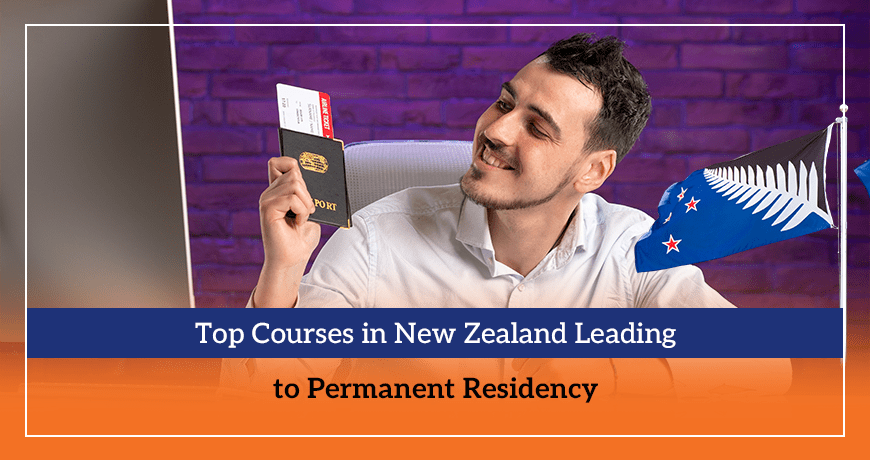Are you an international student or professional eyeing a permanent residency (PR) visa in New Zealand? If so, choosing the right course can significantly boost your chances of securing a fulfilling life.
Permanent Residency in New Zealand offers many benefits, including the right to work and live permanently, access to world-class healthcare and education, and the opportunity to sponsor family members.
Want to know more about the PR process after completing your studies? Check out our in-depth guide: How to Get PR in New Zealand After Study.
To make the most of your study abroad journey and prepare for a successful PR application, it's crucial to select a course that aligns with New Zealand's skill shortages and immigration policies. Let’s dive deeper and learn about the best courses in New Zealand for PR.
Pathways to Permanent Residency through Education
Study to Work Pathway
One of the most common routes to Permanent Residency (PR) in New Zealand is the study-to-work pathway. This pathway involves completing a recognized qualification, transitioning to a work visa, and gaining valuable work experience.
Here's a breakdown of the process:
- Student Visa: Obtain a student visa to study at a designated educational institution in New Zealand.
- Work Visa: Upon completing your studies, apply for a work visa to work in your field.
- Gain Work Experience: Accumulate relevant work experience in a skilled occupation. This experience is crucial for your PR application.
Green List Pathways
New Zealand's Green List is a list of occupations in high demand and offers faster pathways to PR. Studying and working in a Green List occupation can significantly increase your chances of securing a PR visa.
Here's how the Green List can benefit you:
- Faster Processing Times: Green List occupations often have shorter processing times for work visa applications.
- Higher Points: When applying for PR, you'll be awarded points based on your occupation. Green List occupations typically earn more points.
- Increased Job Opportunities: Green List occupations are in high demand, which can lead to better job prospects and higher salaries.

Top Courses in New Zealand Leading to Permanent Residency
Information Technology (IT)
New Zealand's thriving tech sector offers many opportunities for IT professionals. Pursuing courses like Software Development, Data Science, or Cybersecurity can position you for a successful career. These fields are in high demand, particularly in emerging technologies such as artificial intelligence and machine learning. With many IT roles on the Green List, you can significantly boost your chances of securing a PR visa.
Engineering
New Zealand's infrastructure development and construction projects strongly demand engineers. Civil, Mechanical, and Electrical Engineering are popular choices. As a skilled engineer, you can contribute to significant projects, gain valuable experience, and pave the way for a prosperous future in the country.
Healthcare and Nursing
The healthcare sector in New Zealand is experiencing steady growth, making it an excellent choice for international students. Nursing, Medical Technology, and Healthcare Management are highly sought-after fields. Pursuing a qualification in these areas can contribute to New Zealanders' well-being and increase their chances of securing a PR visa.
Business and Management
New Zealand's dynamic business environment offers numerous opportunities for business professionals. An MBA, Business Analytics, or Project Management degree can equip you with the skills and knowledge needed to succeed in various industries. These qualifications can open doors to leadership and managerial positions, enhancing your career prospects and PR eligibility.
Construction and Trades
The construction industry in New Zealand is experiencing significant growth, creating a demand for skilled tradespeople. Courses like Construction Management, Carpentry, and Electrical Work can lead to well-paying jobs and strong PR prospects. By acquiring practical skills and experience, you can contribute to the country's infrastructure development and secure a stable future.
Agriculture and Agribusiness
New Zealand's agricultural sector is a major economic driver, renowned for its high-quality produce and sustainable practices. Studying Agribusiness Management, Viticulture, or Environmental Science can open doors to exciting career opportunities in this field. With a strong focus on innovation and technology, the agricultural sector offers ample opportunities for skilled professionals.
Tourism and Hospitality
New Zealand's stunning landscapes, diverse culture, and world-class tourism experiences attract visitors from around the globe. Pursuing courses in Hospitality Management, Tourism, or Culinary Arts can lead to rewarding careers in this vibrant industry. By gaining experience in hospitality and tourism, you can contribute to the country's economy and enhance your PR prospects.
Education
The education sector in New Zealand always needs qualified teachers and early childhood educators. By pursuing a teaching qualification, you can make a positive impact on the lives of young learners. The demand for skilled educators, particularly early childhood education, creates strong employment opportunities and potential PR pathways.
Creative Arts and Design
New Zealand's creative industries are thriving, offering opportunities for talented individuals in fields like Graphic Design, Film Production, and Visual Arts. Pursuing a creative arts or design course can develop your skills, network with industry professionals, and potentially contribute to the country's vibrant cultural scene.
Environmental Science
Environmental science is a promising field with a growing emphasis on sustainability and environmental conservation. Courses in Environmental Science, Conservation, and Sustainable Management equip you with the knowledge and skills to address environmental challenges. Contributing to environmental sustainability can positively impact the planet and enhance your career prospects.
Comparison Table: Best Courses vs. PR Eligibility
|
Course Name
|
Job Sector
|
Green List Occupation
|
PR Pathway
|
Median Salary (approx.)
|
|
Software Engineering
|
Information Technology
|
Software Engineer
|
Skilled Migrant Category
|
NZD $100,000+
|
|
Data Science
|
Information Technology
|
Data Analyst
|
Skilled Migrant Category
|
NZD $90,000+
|
|
Cybersecurity
|
Information Technology
|
Cybersecurity Specialist
|
Skilled Migrant Category
|
NZD $110,000+
|
|
Civil Engineering
|
Engineering
|
Civil Engineer
|
Skilled Migrant Category
|
NZD $95,000+
|
|
Mechanical Engineering
|
Engineering
|
Mechanical Engineer
|
Skilled Migrant Category
|
NZD $90,000+
|
|
Nursing
|
Healthcare
|
Registered Nurse
|
Skilled Migrant Category
|
NZD $65,000+
|
|
MBA
|
Business and Management
|
Management Consultant
|
Skilled Migrant Category
|
NZD $120,000+
|
|
Construction Management
|
Construction
|
Construction Project Manager
|
Skilled Migrant Category
|
NZD $100,000+
|
|
Agribusiness Management
|
Agriculture
|
Agricultural Manager
|
Skilled Migrant Category
|
NZD $80,000+
|
|
Hospitality Management
|
Tourism and Hospitality
|
Hospitality Manager
|
Skilled Migrant Category
|
NZD $60,000+
|
|
Teaching
|
Education
|
Secondary School Teacher
|
Skilled Migrant Category
|
NZD $70,000+
|
|
Graphic Design
|
Creative Arts and Design
|
Graphic Designer
|
Skilled Migrant Category
|
NZD $60,000+
|
|
Environmental Science
|
Environmental Science
|
Environmental Scientist
|
Skilled Migrant Category
|
NZD $75,000+
|

Factors to Consider When Choosing a Course
Aligning with the Green List
One of the most crucial factors to consider is the alignment of your chosen course with New Zealand's Green List. This list identifies occupations in high demand and offers faster pathways to permanent residency (PR). By selecting a course that leads to a Green List occupation, you can significantly increase your chances of obtaining a PR visa.
Job Market Demand
Assessing the current and future demand for your chosen field in New Zealand's job market is essential. Researching industry trends and labour market reports and consulting with career advisors can provide valuable insights. Strong job market demand will enhance your employability and strengthen your PR application.
Post-Study Work Opportunities
After completing your higher studies, you’ll be eligible for a post-study work visa. It allows you to gain valuable work experience in your field and improve your PR prospects. When choosing a course, consider the availability of post-study work visas and the potential job opportunities in your chosen sector.
Long-Term Career Prospects
Look beyond immediate job prospects and consider your chosen field's long-term sustainability and growth potential. Consider factors such as technological advancements, industry trends, and emerging opportunities. A field with a strong future outlook can provide you with a stable career and a solid foundation for your long-term goals in New Zealand.

Steps to Apply for Permanent Residency After Completing Your Course
Step 1: Obtain a Post-Study Work Visa
Once you've completed your studies, you may be eligible for a Post-Study Work Visa. This visa allows you to work in New Zealand for a specified period, typically 1 to 3 years. To apply for a Post-Study Work Visa, you'll need to meet certain criteria, including:
- Completion of a recognized qualification: Ensure your qualification is recognized by the New Zealand Qualifications Authority (NZQA).
- Sufficient funds: You must prove you have enough funds to support yourself and your dependents.
- Health and character requirements: You must undergo a health check and police clearance.
- A Post-Study Work Visa provides a valuable opportunity to gain work experience, network with professionals, and improve your English language skills.
Step 2: Gain Relevant Work Experience
Accumulating relevant work experience in New Zealand is crucial for your PR application. Working in your field can gain valuable skills, knowledge, and industry experience. This work experience will strengthen your PR application and demonstrate your value to the New Zealand economy.
Consider the following tips to maximize your work experience:
- Seek opportunities: Actively seek employment in your field and network with professionals.
- Gain diverse experience: Try to gain experience in different roles and industries to broaden your skill set.
- Document your experience: Record your work experience, including job descriptions, responsibilities, and achievements.
Step 3: Apply for Permanent Residency
After gaining sufficient work experience, you can apply for Permanent Residency through the Skilled Migrant Category (SMC). The SMC assesses your age, qualifications, work experience, and English language proficiency.
Alternatively, if your occupation is on the Green List, you may be eligible for a faster pathway to PR. The Green List identifies occupations in high demand in New Zealand and offers streamlined processing times for work visa and PR applications.
To apply for PR, you'll need to submit a comprehensive application, including:
- Expression of Interest (EOI): This outlines your skills, experience, and qualifications.
- Supporting documents: These may include your passport, academic transcripts, work experience certificates, and language test results.
- Immigration Health Assessment: A health check to ensure you meet health requirements.
- Character Reference Checks: Police clearance certificates from all countries you've lived in for over 12 months.
Frequently Asked Questions
Which course is best for PR in New Zealand?
Courses aligned with New Zealand's Green List occupations, such as IT, engineering, healthcare, and certain trades, offer better PR prospects.
How long does it take to get PR after studying in New Zealand?
The timeline varies depending on your chosen course, work experience, and immigration processing times. Generally, it can take 2-3 years or more.
Can all courses lead to PR in New Zealand?
While most courses can potentially lead to PR, those aligned with the Green List and offering work experience opportunities have a higher likelihood.
What are the most in-demand occupations for PR in New Zealand?
In-demand occupations include IT specialists, engineers, healthcare professionals, tradespeople, and certain business and management roles.
Do I need a job offer to apply for PR after studying?
While a job offer can strengthen your application, it's not always mandatory. Relevant work experience and qualifications are key factors.
How does the Green List impact PR eligibility?
Green List occupations offer faster processing times and higher points towards PR. Choosing a course aligned with the Green List can significantly improve your chances.
Can I apply for PR while still studying?
No, you generally cannot apply for PR while still on a student visa. Before applying for PR, you must complete your studies and obtain a work visa to gain relevant work experience.
What is the difference between PR and a work visa?
A work visa allows you to work in New Zealand for a specific period, while PR grants you permanent residency, enabling you to live and work indefinitely.
Are there scholarships available for PR pathway courses?
Yes, various scholarships are available for international students pursuing studies in New Zealand. Check with specific institutions and government websites for details.
How can I improve my chances of getting PR in New Zealand?
To improve your chances, choose a course aligned with the Green List, gain relevant work experience, achieve high academic results, and ensure strong English language proficiency.
Conclusion
Choosing from the best courses in New Zealand for PR is a pivotal step in your journey. By aligning your studies with in-demand occupations, such as those on the Green List, you can significantly boost your chances of securing a successful PR application. To maximize your chances of success, consult with education and immigration experts who can provide personalized guidance. With careful planning and strategic decision-making, you can make your dream of living and working in New Zealand a reality.